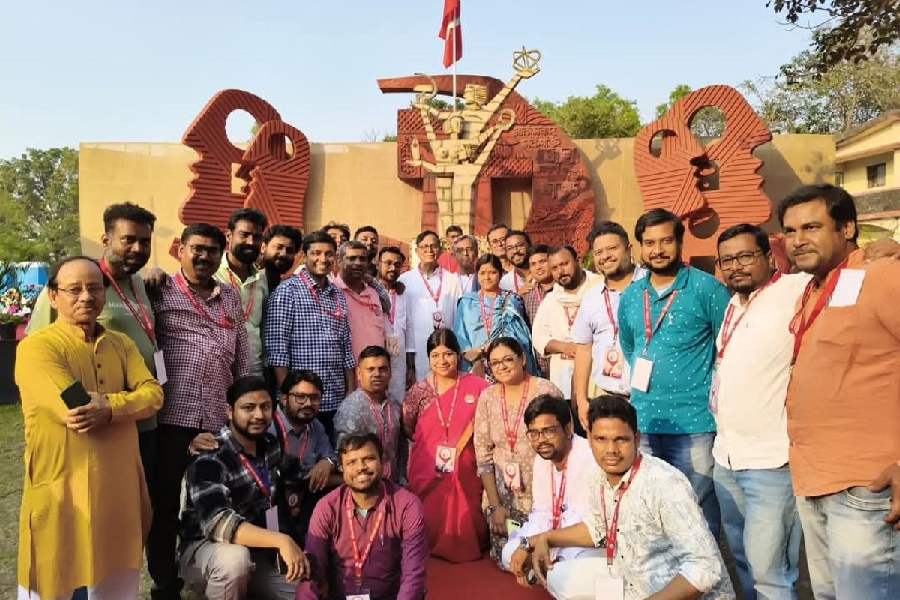What’s in a language? Ask the CPM.
CPM sources said at least three delegates participating at the party’s four-day state conference in Hooghly’s Dankuni have finallyspoken out.
Almost 14 years after the party lost power in Bengal, the delegates who are from the state’s rural areas, spoke on the party’s continuing disconnect with the people and have identified at least one reason for the detachment — the language in which leaders communicate is lost on the masses, particularly the underprivileged.
CPM state secretary Md Salim at Sunday’s media interaction did speak about the need to bridge the gulf between the party and people. However, it took a few delegates from the districts to do some plain speaking.
Sources said that during their presentation at the conference, a few delegates felt most leaders, particularly those belonging to the younger generation, might have the proverbial gift of the gab but not necessarily the “right language” to communicate with the toiling masses, the backbone of the Left Front’s 34-year rule in Bengal.
“Even in technologically advanced times, language is the most important tool of communication between the people and the party. It is an art and communists should be able to walk with ease on both sides of the language divide — the suave and the rustic,” said a senior CPM leader.
In the past, critics of the Left had often ridiculed it for its obsession with the use of high-sounding political terminology in their speeches. But the criticism being raised at the CPM meet is more basic — the inability of the current crop to speak in the common man’s tongue.
Several among the young CPM leaders are well educated, come from middle-class families, speak Bengali, English and Hindi with ease, freely quote Rabindranath Tagore and Karl Marx and are comfortable in communicating in a tongue that is very urbane.
However, critics have picked on the urbane features of these leaders to argue that the lack of the “right tongue” is not helping the party bridge its gulf with the marginalised sections of the people, whose support is required for the CPM’s revival in Bengal.
“Most of these youths have grown up in urban spaces, studied in good institutions, been part of students or youth movements and the party has rightly infused young blood to chart CPM’s revival in Bengal. But it is for the party to shape them into leaders who speak the language of the masses,” the leader said.
That is easier said than done.
The leader added: “The party needs to take young leaders out of their comfort zones and place them amid farmers, workers, tribals and the marginalised people. That will help them acquire a language and vocabulary spoken and understood at the grassroots. Like our slogans, the language of the leaders should remain rooted in ideology but spoken in common man’s lingo.”
A host of CPM leaders including Jyoti Basu, Robin Sen, Pramode Dasgupta, Harekrishna Konar, Benoy Chowdhury and Biman Bose came from relatively well-to-do families but their political lives and language were chiselled during their stints in the trade union and peasant movements where they mixed with the common people.
“Their lingo was born out of their interaction with the people at the grassroots. Some leaders like Bose are known to have spent days in tribal areas to organise them,” a CPM leader from Bankura said.
“Those who represent our party in public need to use words and expressions the poor of this state understand. Jargons like ‘narrative’, ‘corrupt’ might be familiar to an educated audience but do not impact the common people. If we want to attack the Trinamool for corruption, instead of words like ‘apadomostok durnitigrosto dal (totally corrupt party), saying ‘ekta choreder dal (a party of thieves)’ can create an immediate connect with people at public meetings,” saidanother leader.
The leader recollected how party stalwarts like Ramnarayan Goswami, health minister in Jyoti Basu’s cabinet, could speak in a rustic tongue that would immediately resonate with the common people.
“Once Ramnarayan-da was addressing a rally in Burdwan’s Rasikpur in the aftermath of the Babri Masjid demolition. By then, RSS affiliates like the VHP had given the call to collect bricks from every home for the temple in Ayodhya. Goswami asked people to be alert as some thieves were stealing bricks in the name of building a temple but their intention was to damage people’s harmony brick by brick. He used rustic words and rural metaphors to strike a chord with the people and send across the intended message,” an elderly party leader said.
He also wished that the CPM regained the “lost tongue”.
The veteran lauded young leaders like Minakshi Mukherjee, Dhrubajyoti Saha and Pratikur Rahaman for speaking in a language free from jargon.
“We need more like them.... The popularity of Minakshi among all sections of party supporters shows she has been able to have an impact on them and most of it has happened through her bilingual speeches and leadership qualities. But she has a bigger task at hand — reaching out to people beyond her support base. If she achieves that, it will be a real test of her communication skills, something the party desperately needs if it has to rejuvenate,” the veteran said.











